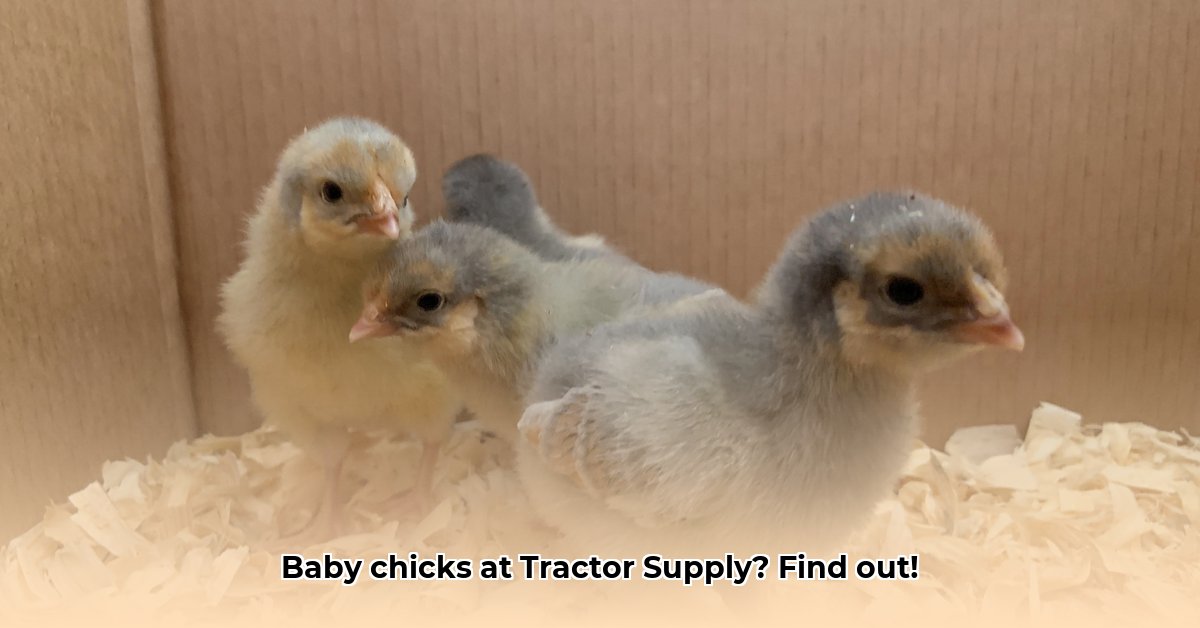
Selecting Your Chicks at Tractor Supply: Finding Your Perfect Flock
Choosing your chicks at Tractor Supply is an exciting first step! Generally, you'll find chicks ranging from one to four days old. But age isn't everything – their health is paramount. Look for bright, alert chicks with clean vents (where they poop). Avoid any that appear lethargic, weak, or show signs of illness. Consider the breed, as different breeds have varying needs and characteristics – some excel at egg-laying, others are raised for meat. Research beforehand to ensure a good fit for your lifestyle and resources. Remember, a healthy, vigorous chick is key to successful raising. For more information on chick days at Tractor Supply, check out this helpful resource.
Setting Up Your Brooder: Creating a Chick Haven
Before your chicks arrive, prepare their "condo"—a brooder. This safe haven keeps them warm and comfortable. You'll need a heat source (like a heat lamp) to maintain a temperature of approximately 95°F (35°C) initially, gradually decreasing as they grow. Use a thermometer to monitor the temperature accurately. Good ventilation is crucial; avoid completely sealing the brooder. Choose soft bedding such as pine shavings or paper towels; avoid cedar shavings, as they are toxic to chicks.
Here's a step-by-step setup:
- Choose a container: Use a sturdy plastic storage bin, a strong cardboard box, or a large, shallow tub.
- Add bedding: Spread a layer of clean pine shavings or paper towels.
- Install a heat lamp: Hang it securely, high enough to prevent burns. Monitor temperature diligently.
- Provide food and water: Use chick feeders and waterers to prevent spills and maintain cleanliness.
- Constant Monitoring: Regularly check the temperature, bedding, and chick activity.
Feeding Your Baby Chicks: Fueling Healthy Growth
Proper nutrition from day one is vital. Tractor Supply and other feed stores offer specialized chick starter feed, packed with essential vitamins and nutrients for early growth. Ensure constant access to fresh, clean water. Remember, these tiny creatures need plenty of fuel to grow big and strong! The type of feed (meat bird vs. layer) might vary depending on the breed; carefully choose the appropriate formula.
Monitoring Chick Health: Early Detection Saves Lives
Regularly check your chicks for any signs of illness. "Pasty butt" (a common issue where droppings clog the vent) requires gentle cleaning with a warm, damp cloth. Contact a veterinarian immediately if you observe lethargy, ruffled feathers, or loss of appetite. Early detection prevents minor problems from becoming major health crises.
Dr. Emily Carter, DVM, Avian Specialist at Countryside Veterinary Clinic, emphasizes, "Consistent monitoring is critical. Early intervention can significantly improve chick survival rates."
Gradual Integration into Your Coop: A Smooth Transition
Once your chicks are a few weeks old and feathered, start gradually introducing them to their permanent coop. This minimizes stress and allows them to adjust slowly. Do this over several days, monitoring their behavior closely. A smooth transition ensures a healthy and happy flock.
Common Chick Problems and Solutions: Troubleshooting Your Flock
Here are solutions for common issues:
| Problem | Solution |
|---|---|
| Pasty Butt | Gentle cleaning; ensure hydration; adjust diet. |
| Lethargy | Check temperature, water, and feed; vet consultation is recommended. |
| Poor Feathering | Nutritional deficiencies or temperature issues; consult a vet. |
| Disease Outbreak | Isolate affected chicks; veterinary care; thorough coop sanitation. |
Remember, the age of your Tractor Supply chicks (typically 1-4 days old) is only the beginning. Providing proper care, attention, and a safe environment ensures your chicks thrive!